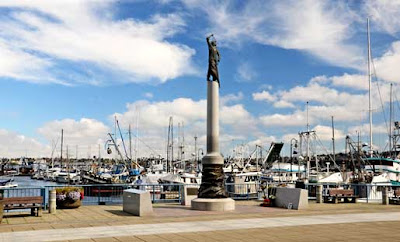I have never been to Cyprus. I'm certain that it is a lovely land, and that the Cypriots are lovely people. There it sits, a sun-bathed jewel in the blue Mediterranean, just offshore from the fabled lands that Herodotus wrote of long ago: Phoenicia, Cilicia, Pamphylia, Lycia.
However, I confess that I cannot muster any concern for the liquidity of Cyprus. For as long as I can remember (five-odd decades), I've been hearing that the world is on the verge of economic calamity. But, as far as I can tell, economic history boils down to this: "It's all fun and games until someone loses an eye."
I know next to nothing about how to live. I cannot claim to have gained any wisdom during my time on Earth. But I have a sense that life is not as complicated as we make it out to be.
Roland Vivian Pitchforth, "Cottage, Bainbridge" (1928)
Night
That shining moon -- watched by that one faint star:
Sure now am I, beyond the fear of change,
The lovely in life is the familiar,
And only the lovelier for continuing strange.
Walter de la Mare, Memory and Other Poems (1938).
Roland Vivian Pitchforth, "Hebden, Yorkshire"
Of course, our appreciation of the lovely familiars in life may be enhanced if we bear certain things in mind.
Waiting
'Waiting to . . .'
'Who is?'
'We are . . .
Was that the night-owl's cry?'
'I heard not. But see! the evening star;
And listen! -- the ocean's solacing sigh.'
'You mean the surf at the harbour bar?'
'What did you say?'
'Oh, "waiting".'
'"Waiting? " --
Waiting what for?'
'To die.'
Walter de la Mare, Ibid.
The reference to the sound of "the surf at the harbour bar" in line 7 brings to mind two other poems that have death as their subject: Tennyson's "Crossing the Bar" ("may there be no moaning of the bar") and Charles Kingsley's "The Three Fishers" ("though the harbour bar be moaning").
Roland Vivian Pitchforth, "Bainbridge" (1928)












